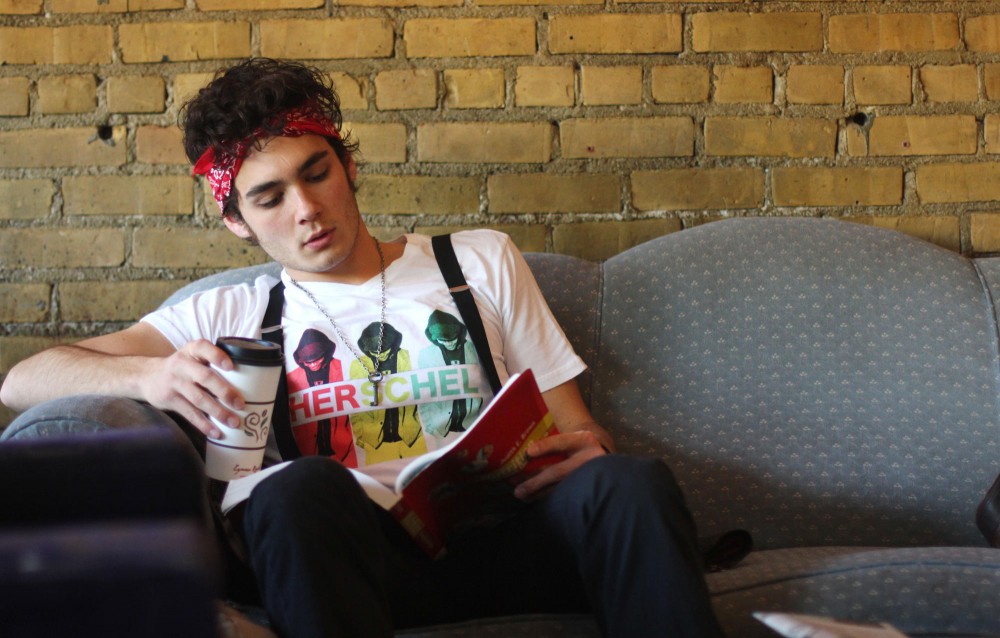Last semester, Michael Senich would grab a cheap Panini and head to the Pantheon to do his homework after classes.
Instead of television, the University of Minnesota junior would watch people âÄî especially tourists âÄî navigate the streets of Rome, Italy where he studied abroad for three months.
He calls the journey the most amazing experience of his life. But itâÄôs difficult for him to talk about that now.
He doesnâÄôt like to reminisce too much. Since the start of the semester, heâÄôs back to studying at Espresso Royale in Dinkytown because the coffee shops âÄúarenâÄôt too different here.âÄù
âÄúI had kind of a culture shock coming back,âÄù he said. âÄúMore so than going there. I felt like I was going backwards.âÄù
Senich isnâÄôt alone.
All of the more than 1,200 students who study abroad per semester face some form of reverse culture shock when they return, according to the Learning Abroad Center.
Brook Blahnik, director of advising for the Learning Abroad Center said the transition back to day-to-day life is a difficult and multifaceted issue.
âÄúPeople really expect to have issues when they leave,âÄù he said. âÄúBut they donâÄôt expect to become so acculturated and attached to a country that they have trouble coming home.âÄù
âÄòCompletely changedâÄô
Sara Brammer-Shlay had been talking about Israel her entire life.
âÄúIâÄôm Jewish, so Israel has always been a topic of discussion,âÄù she said. âÄúI always thought it was a place I was meant to be at some point.âÄù
Last spring, she took the long-awaited trip when she studied abroad in the country where she said she was able to discuss her faith freely and intellectually âÄîabout 75 percent of her classmates were also Jewish.
âÄúI definitely transformed in my faith,âÄù she said. âÄúComing back, I think my identity as a Jew completely changed.âÄù
But coming home after that transformation wasnâÄôt easy, Brammer-Shlay said.
She said she experienced the stages of re-entry into home life outlined by the Learning Abroad Center though she never expected she would.
âÄúI donâÄôt want to talk about my experience too much,âÄù she said. âÄúItâÄôs difficult for people to understand.âÄù
After the honeymoon
The Learning Abroad Center offers specific programming to address every step along what they call the cross-cultural adjustment curve which features varied levels of comfort and discomfort in both the host and home cultures.
These stages include an initial âÄúhoneymoonâÄù phase where students become fascinated in the every aspect of the country they visit, a critical low point where they feel detached from the new culture, an eventual phase where they adapt and assimilate and reverse-culture shock upon returning home.
Though Blahnik admits it is an area with room for improvement, the Learning Abroad Center offers programming to deal with the feelings of isolation and confusion that often accompany the return to the U.S.
Each semester, 70-90 students enroll in an online Global Identity course during the study abroad experience, which features assignments during each critical point along the adjustment curve.
Returnees can also become Global Ambassador Interns to share their experiences with students interested in studying abroad.
âÄúAll of our re-entry opportunities are really focused on sharing stories,âÄù Sara Cokl, an adviser with the study abroad program said. âÄúA lot of the transition is about being able to talk.âÄù
Brammer-Shlay has found this opportunity through her student intern position with the Learning Abroad Center, where she shares her story with other students interested in traveling to Israel.
âÄúThat way I can talk to people who actually want to hear it,âÄù she said.
According to the Learning Abroad Center, one of the most successful programs is a workshop each semester where students learn how to make their experiences marketable to employers.
âÄúNobody wants to sit around and talk about their feelings,âÄù Cokl said. âÄúItâÄôs something deeply personal, so we try to provide things with a tangible take-away.âÄù
Senich said he wishes he would have known about these opportunities.
The junior said he experienced a depression upon returning to the U.S. and he is just now getting over the hump.
âÄòWhere my heart isâÄô
Spencer Virden had never been outside of Northeast Minneapolis for more than a week before studying abroad in Venezuela last spring.
Virden said he decided to look into study abroad opportunities because nobody in his family had ever traveled and to do so would âÄúbe a beautiful thing.âÄù
âÄúFor the first time I saw a waterfall, I saw an ocean, I saw mountains and things I never couldâÄôve imagined,âÄù he said. âÄúI felt like I was getting my mind blown every day.âÄù
But unlike Senich and Brammer-Shlay, he said the trip home was much anticipated.
He said he didnâÄôt experience any of the reverse culture-shock he heard about from his adviser.
âÄúI missed my homies and my family,âÄù he said. âÄúIt was a great experience, but itâÄôs always good to come back home. This is where my heart is.âÄù


